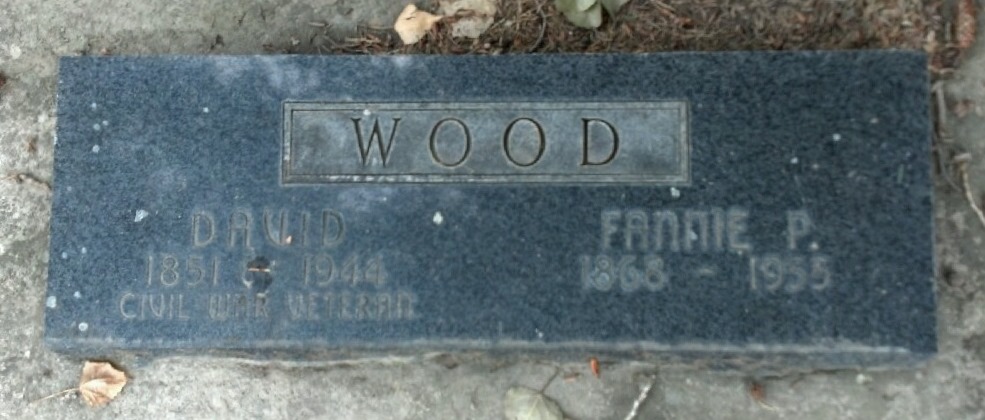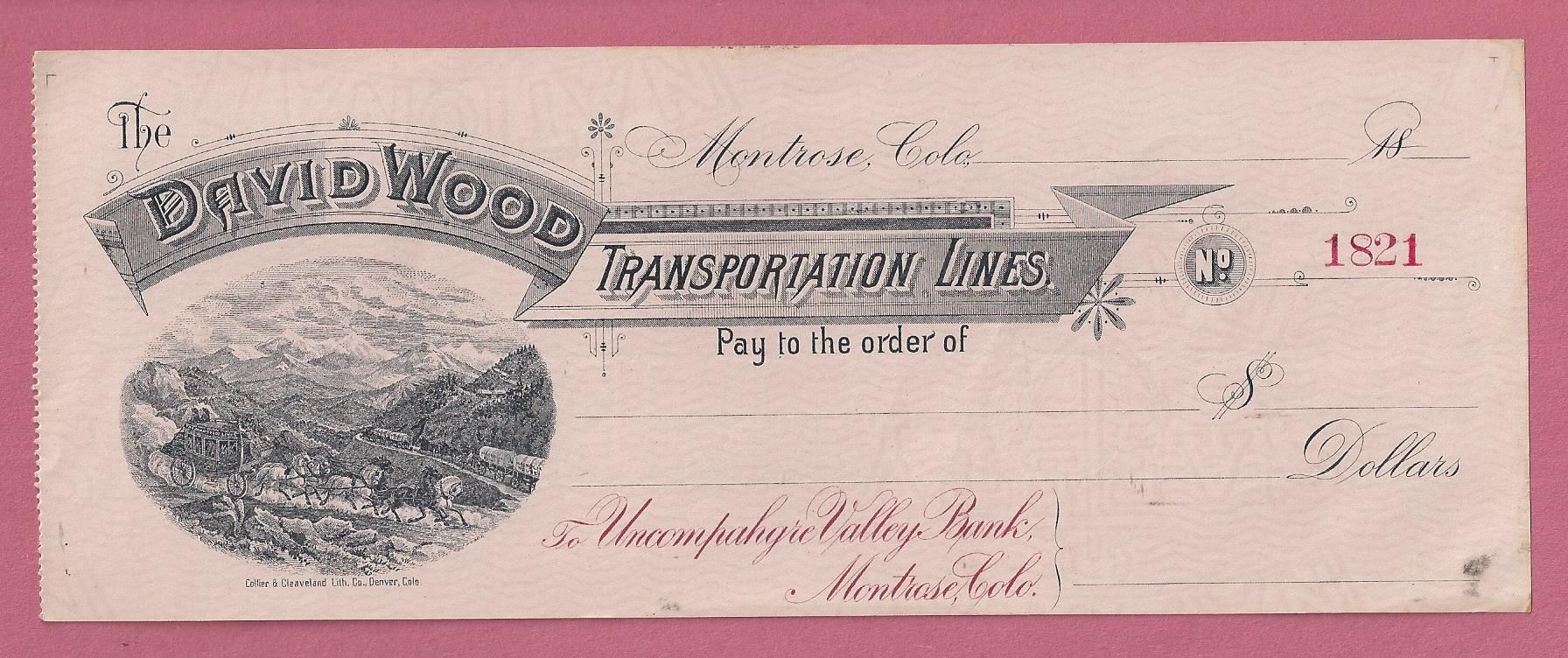David Wood went with his father to the Civil War when he was a boy of 10.
David Wood went to Colorado in 1876.
David Wood married Mary Dill Wood on December 24, 1884 in Topeka, Kansas. Mary died of childbirth fever in 1885. A week later, their baby daughter Marguerite Wood (born 10/4/1885) died at 9 days old. They were both buried in Cottonwood Falls, Kansas.
David Wood married Fannie Parker Wood 1888 after Mary died in 1885.
David Wood is featured in the book "I Hauled These Mountains In Here!" written by his daughters Frances and Dorothy Wood in 1977.
Source: "I Hauled These Mountains In Here"
- - -
From University of Wyoming, American Heritage Center
Guide to Transportation History Resources
http://ahc.uwyo.edu/documents/use_ archives/guides/transportation.pdf
Wood, David Papers, 1879-1890.
.9 cubic ft. (2 boxes) Acc. #7261
David Wood (1851-1944) operated a freight and passenger stage service in the San Juan mining district of Colorado. He entered the Union Army's 6th Missouri Cavalry in 1862 during the Civil War. Wood came to Pueblo, Colorado, in 1876 and operated a freight line, the David Wood Transportation Lines, from the end of the railroad tracks to mining camps in Lake City, Ouray, Telluride, Rico and Montrose, Colorado. He lost his company to the 1893 silver panic and operated a ranch near Montrose afterwards.
Collection contains miscellaneous business records relating to Woods' freight service, including a cashbook (1879-1883); 3 daybooks (1883, 1885, 1890); general journals (1883-1884, 1887-1889); a supply order book (1883); and a shipping register for the Colorado and Wyoming Stage, Mail and Express Company (1885).
- - -
Record Type: Incorporation Records
Archive Location: S500
Name: DAVID WOOD TRANSPORTATION Co.
County:
Year: 1893 Month: MAY Day: 1
Origin: Secretary of State
- - -
1910 Portland, Ouray Co, Colorado
David Wood 56 OH
Fannie Wood 41 KY
Ruth C Wood 19 CO
William L Wood 16 CO
Francis E Wood 13 CO
John C Wood 11 CO
David Wood Jr 8 CO
Albert B Wood 6 CO
Dorothy Wood 3 CO
- - -
The most successful freighter in southwestern Colorado was Dave Wood. Entering the business at Gunnison in 1881, when the D&RG made him their "forwarding and commission merchant", Wood freighted supplies west to construction gangs and newly-settled towns from the railroad's end-of-the-line. When the D&RG built its narrow gauge line through the Black Canyon and over Cerro Summit into Montrose, Wood took his business to that town. Montrose would be his largest and most permanent base, and for five years he was the exclusive agent for all freight going to Ouray, Telluride, and Rico. The D&RG extension, built from Montrose to Ouray in 1887, forced Wood to again move his base of operations. From his new location at Ridgway, he did a large freighting business into Telluride and Norwood. The completion of the Rio Grande Southern in 1891 ended Wood's operations. Built in 1882, the famous Dave Wood Road between Montrose and Telluride, via Horsefly Mesa, ran on the west side of the Uncompahgre River parallel with the present highway from Montrose to Ouray, and is today identified by a U. S. Forest Service marker.
Stage line operators, as did freighting outfits, arranged their schedules and bases of operation in accordance with the advancing railroad. Quick to see the advantage of end-of-the-line staging were Bradley Barlow and Jared Sanderson. Even before the entrance of the D&RG and the DSP&P into southwestern Colorado, Barlow and Sanderson stages ran from Chama, New Mexico to Pagosa Springs, Durango, Animas City, and Silverton. As soon as Otto Mears had completed his Marshall Pass Toll Road, stages ran to Gunnison, Crested Butte, Irwin, and Gothic. Railroad expansion in 1881 and 1882 forced the Sanderson company's coaches higher into the San Juans and onto the Uncompahgre Plateau. Stages provided service from Gunnison to newly settled Montrose, where the company's stage barn was one of the early frame buildings. The fare for the rugged trip was $16.50 one way, with each passenger allowed fifty pounds of baggage. Between 1882 and 1890, moving south from Ridgway, Sanderson coaches ran to Placerville, San Miguel City, Telluride, Ophir, and Rico. As had been the case with Dave Wood's freighting business, the completion of the Rio Grande Southern Railroad brought an end to the Barlow and Sanderson Stage line. By 1900, except for the few operations in areas where the railroads did not run, the day of the large-scale wagon freighting business and the stage coach had given way to more modern forms of transportation.
Source: Frontier in Transition: A History of Southwestern Colorado, BLM Cultural Resources Series (Colorado: No. 10), Chapter 8: Transportation and Mining (1881-1920)
David Wood went with his father to the Civil War when he was a boy of 10.
David Wood went to Colorado in 1876.
David Wood married Mary Dill Wood on December 24, 1884 in Topeka, Kansas. Mary died of childbirth fever in 1885. A week later, their baby daughter Marguerite Wood (born 10/4/1885) died at 9 days old. They were both buried in Cottonwood Falls, Kansas.
David Wood married Fannie Parker Wood 1888 after Mary died in 1885.
David Wood is featured in the book "I Hauled These Mountains In Here!" written by his daughters Frances and Dorothy Wood in 1977.
Source: "I Hauled These Mountains In Here"
- - -
From University of Wyoming, American Heritage Center
Guide to Transportation History Resources
http://ahc.uwyo.edu/documents/use_ archives/guides/transportation.pdf
Wood, David Papers, 1879-1890.
.9 cubic ft. (2 boxes) Acc. #7261
David Wood (1851-1944) operated a freight and passenger stage service in the San Juan mining district of Colorado. He entered the Union Army's 6th Missouri Cavalry in 1862 during the Civil War. Wood came to Pueblo, Colorado, in 1876 and operated a freight line, the David Wood Transportation Lines, from the end of the railroad tracks to mining camps in Lake City, Ouray, Telluride, Rico and Montrose, Colorado. He lost his company to the 1893 silver panic and operated a ranch near Montrose afterwards.
Collection contains miscellaneous business records relating to Woods' freight service, including a cashbook (1879-1883); 3 daybooks (1883, 1885, 1890); general journals (1883-1884, 1887-1889); a supply order book (1883); and a shipping register for the Colorado and Wyoming Stage, Mail and Express Company (1885).
- - -
Record Type: Incorporation Records
Archive Location: S500
Name: DAVID WOOD TRANSPORTATION Co.
County:
Year: 1893 Month: MAY Day: 1
Origin: Secretary of State
- - -
1910 Portland, Ouray Co, Colorado
David Wood 56 OH
Fannie Wood 41 KY
Ruth C Wood 19 CO
William L Wood 16 CO
Francis E Wood 13 CO
John C Wood 11 CO
David Wood Jr 8 CO
Albert B Wood 6 CO
Dorothy Wood 3 CO
- - -
The most successful freighter in southwestern Colorado was Dave Wood. Entering the business at Gunnison in 1881, when the D&RG made him their "forwarding and commission merchant", Wood freighted supplies west to construction gangs and newly-settled towns from the railroad's end-of-the-line. When the D&RG built its narrow gauge line through the Black Canyon and over Cerro Summit into Montrose, Wood took his business to that town. Montrose would be his largest and most permanent base, and for five years he was the exclusive agent for all freight going to Ouray, Telluride, and Rico. The D&RG extension, built from Montrose to Ouray in 1887, forced Wood to again move his base of operations. From his new location at Ridgway, he did a large freighting business into Telluride and Norwood. The completion of the Rio Grande Southern in 1891 ended Wood's operations. Built in 1882, the famous Dave Wood Road between Montrose and Telluride, via Horsefly Mesa, ran on the west side of the Uncompahgre River parallel with the present highway from Montrose to Ouray, and is today identified by a U. S. Forest Service marker.
Stage line operators, as did freighting outfits, arranged their schedules and bases of operation in accordance with the advancing railroad. Quick to see the advantage of end-of-the-line staging were Bradley Barlow and Jared Sanderson. Even before the entrance of the D&RG and the DSP&P into southwestern Colorado, Barlow and Sanderson stages ran from Chama, New Mexico to Pagosa Springs, Durango, Animas City, and Silverton. As soon as Otto Mears had completed his Marshall Pass Toll Road, stages ran to Gunnison, Crested Butte, Irwin, and Gothic. Railroad expansion in 1881 and 1882 forced the Sanderson company's coaches higher into the San Juans and onto the Uncompahgre Plateau. Stages provided service from Gunnison to newly settled Montrose, where the company's stage barn was one of the early frame buildings. The fare for the rugged trip was $16.50 one way, with each passenger allowed fifty pounds of baggage. Between 1882 and 1890, moving south from Ridgway, Sanderson coaches ran to Placerville, San Miguel City, Telluride, Ophir, and Rico. As had been the case with Dave Wood's freighting business, the completion of the Rio Grande Southern Railroad brought an end to the Barlow and Sanderson Stage line. By 1900, except for the few operations in areas where the railroads did not run, the day of the large-scale wagon freighting business and the stage coach had given way to more modern forms of transportation.
Source: Frontier in Transition: A History of Southwestern Colorado, BLM Cultural Resources Series (Colorado: No. 10), Chapter 8: Transportation and Mining (1881-1920)
Family Members
Sponsored by Ancestry
Advertisement
Advertisement























